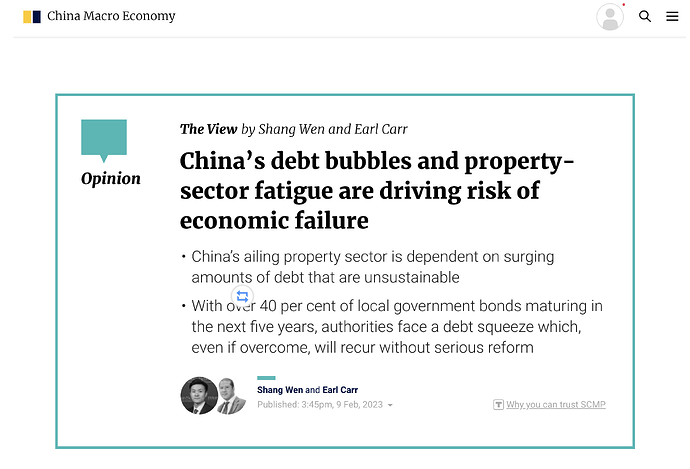-
中国的房地产行业约占其GDP的25%,是经济增长的关键支柱,但它需要大量的债务。
-
今年1月,贵州省西南部的一家地方政府融资公司宣布将推迟偿还价值156亿元的贷款。
-
中国地方政府融资机构的债务估计为60万亿元,地方和区域政府一直依赖这些实体为大型基础设施提供资金,并刺激经济增长。
-
中国的债务在2022年上升到52万亿美元,占GDP的29%,其中企业部门的借款占最大部分。
-
2009年全球金融危机后,地方和地区政府的预算外借贷造成了中国的隐性债务。
-
北京一直试图在避免国有企业公共债务违约的同时对经济进行去杠杆化,最初由于大流行病相关的公司压力,取得了一些进展。
-
中国政府出台了一项政策,即 “三条红线”,限制房地产开发商的债务水平。
-
这一政策对房地产市场产生了巨大影响,导致了政策引发的危机。
-
中国最大、负债最多的房地产开发商之一恒大被迫重组,创始人许家印损失了90%以上的财富。他不得不出售个人房产和私人飞机来偿还公司的债务。
-
由于动态清零政策,地方政府经历了土地销售和收入的滑坡,导致LGFV在低线城市购买土地以减轻财政负担。
-
中央政府在2022年10月禁止使用债务为购买土地融资。
-
开发商经历了现金紧缩,导致 "烂尾楼 "的出现。
-
这导致购房者抵制他们的按揭付款,其中一些造反是有组织的。
-
零科维德政策和政府支持的土地购买给地方政府带来了困难的财政状况。
-
这导致了 "烂尾楼 "和有组织的抵制抵押贷款,这两种情况都让当局感到担忧。
-
中国最近取消了动态清零政策,并推出了援助房地产市场的计划,如对负债累累的开发商提供信贷支持,并延长现有贷款的到期时间。
-
事实证明,房地产行业的去杠杆化运动和摆脱债务驱动模式的愿望对中国经济来说太难了。
-
目前为确保未完成项目的完工和移交所做的努力将有助于让潜在的购房者放心。
-
自1960年代以来,北京官方首次报告人口负增长。
-
这导致了对居住空间的需求放缓,尤其是在低线城市。
-
人口老龄化将增加地方政府的福利支出负担。
-
富裕国家正在探索在大流行病发生后将其供应链 "转移 "或 "在岸 "的方案,这引起了中国经济的担忧。
-
投资者和企业受到了政策翻转的影响,要恢复信心可能需要比销售数字更长时间。
-
由于债务泡沫和房地产行业的疲劳,中国经济正面临失败的风险。
-
地方政府债务的到期日将在2023年达到历史最高点,超过40%的地方债券将在未来五年内到期。
-
开发商可能会重新陷入将债务积累到不可持续的水平的习惯。
-
地方政府仍将依靠卖地获得收入,从而形成一个杠杆-去杠杆的循环。
-
中央政府必须做出早该做出的决定,改革地方政府的筹资机制,扩大社会安全网,深化结构改革。
-
这些改革对于振兴经济增长和避免繁荣与萧条的循环是必要的。
-
应鼓励私营部门的竞争和基于创新的增长,以维持经济增长。
-
China’s property sector represents around 25% of its GDP and is a critical pillar of growth, but it requires surging amounts of debt.
-
In January, an LGFV in southwestern Guizhou province announced it would delay repayment on loans worth 15.6 billion yuan.
-
China’s LGFV debt is estimated at 60 trillion yuan, and local and regional governments have relied on these entities to finance large infrastructure and stimulate economic growth.
-
China’s debt rose to US$52 trillion in 2022, or 295% of GDP, with the corporate sector borrowing making up the largest part.
-
Off-budget borrowing by local and regional governments contributed to China’s hidden debt after the 2009 global financial crisis.
-
Beijing has been attempting to deleverage its economy while avoiding public debt defaults from state-owned enterprises, and made some progress initially due to pandemic-related pressures on companies.
-
The Chinese government introduced a policy, the “three red lines,” which restricted debt levels of property developers.
-
This policy had a huge impact on the real estate market, leading to a policy-induced crisis.
-
Evergrande, one of China’s largest and most indebted real estate developers, was forced to restructure and founder Hui Ka-yan lost more than 90 per cent of his wealth. He had to sell personal properties and private jets to pay off the company’s debt.
-
Local governments experienced a slump in land sales and revenue due to the zero-Covid policy, leading LGFVs to purchase land in lower-tier cities to soften the financial burden.
-
The central government banned the use of debt to finance land purchases in October 2022.
-
Developers experienced cash crunches which resulted in the emergence of “rotten-tail buildings”.
-
This caused homebuyers to boycott their mortgage payments and some of these revolts were organised.
-
The zero-Covid policy and government-backed land purchases created a difficult financial situation for local governments.
-
This led to “rotten-tail buildings” and organised mortgage boycotts, both of which are concerning to authorities.
-
China recently scrapped its zero-Covid policy and rolled out plans to aid the property market, such as credit support for debt-laden developers and extending maturities of existing loans.
-
The deleveraging campaign and desire to break away from the debt-driven model in the property sector proved to be too difficult for China’s economy.
-
Current efforts to ensure the completion and handover of unfinished projects would help reassure prospective homebuyers.
-
For the first time since the 1960s, Beijing officially reported negative population growth.
-
This has led to a slowdown in demand for living spaces, especially in lower-tier cities.
-
An ageing population will increase the burden of local government spending on welfare.
-
Wealthy countries are exploring options to “reshore” or “friendshore” their supply chains in the aftermath of the pandemic, which is a cause for concern for China’s economy.
-
Investors and businesses have been affected by the policy flip-flopping, and it may take longer to revive confidence than sales numbers.
-
China’s economy is at risk of failure due to debt bubbles and fatigue of the property sector.
-
Local government debt maturity will reach a record high in 2023 and more than 40% of local bonds will come due in the next five years.
-
Developers will likely fall back into the habit of building up debt to unsustainable levels.
-
Local governments will still rely on land sales for revenue, creating a leverage-deleverage cycle.
-
The central government must make long-overdue decisions to reform local government funding mechanisms, expand the social safety net and deepen structural reform.
-
These reforms are necessary to rejuvenate economic growth and avoid cycles of boom and bust.
-
Private sector competition and innovation-based growth should be encouraged to sustain economic growth.
